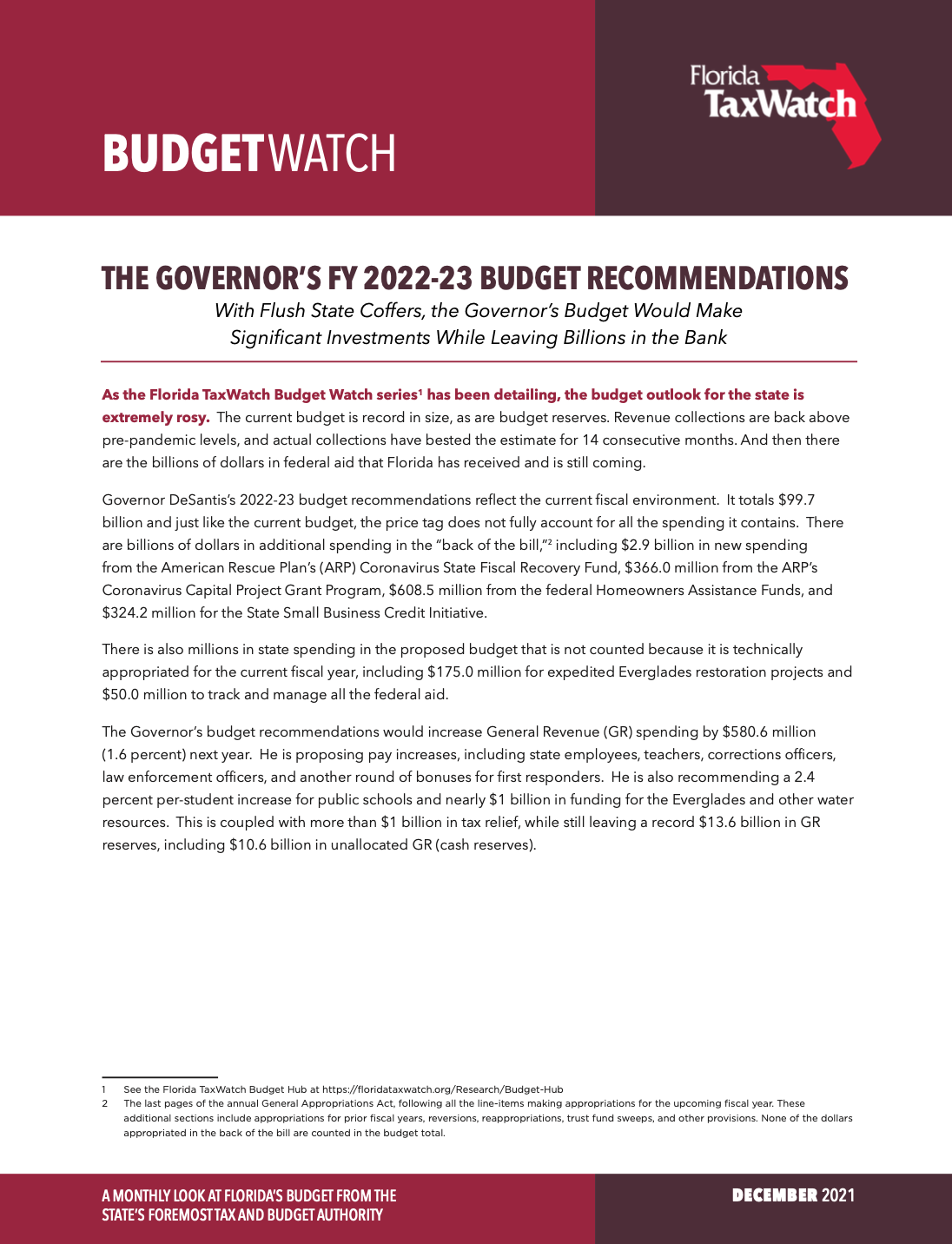THE GOVERNOR’S FY 2022-23 BUDGET RECOMMENDATIONS
With Flush State Coffers, the Governor’s Budget Would Make Significant Investments While Leaving Billions in the Bank

As the Florida TaxWatch Budget Watch series1 has been detailing, the budget outlook for the state is extremely rosy. Governor DeSantis’s 2022-23 budget recommendations reflect the current fiscal environment. It totals $99.7 billion and just like the current budget, the price tag does not fully account for all the spending it contains. There are billions of dollars in additional spending in the “back of the bill,”2 including $2.9 billion in new spending from the American Rescue Plan’s (ARP) Coronavirus State Fiscal Recovery Fund, $366.0 million from the ARP’s Coronavirus Capital Project Grant Program, $608.5 million from the federal Homeowners Assistance Funds, and $324.2 million for the State Small Business Credit Initiative.
The Governor’s budget recommendations would increase General Revenue (GR) spending by $580.6 million
(1.6 percent) next year. He is proposing pay increases, including state employees, teachers, corrections officers, law enforcement officers, and another round of bonuses for first responders. He is also recommending a 2.4 percent per-student increase for public schools and nearly $1 billion in funding for the Everglades and other water resources. This is coupled with more than $1 billion in tax relief, while still leaving a record $13.6 billion in GR reserves, including $10.6 billion in unallocated GR (cash reserves).
BUDGET SNAPSHOT
Total Funding -- $99.677 billion. $1.990 billion (2.0 percent) less than this year’s record budget.
Federal Funding -- $36.293 billion. $3.646 billion (10.0 percent) less than the current year. While this is less than is in the current budget, it understates the budget’s spending of federal funds. There are billions more appropriated that are not included in the budget total, including $2.9 billion from the Coronavirus State Fiscal Recovery Fund.
General Revenue (GR) -- $37.049 billion. $580.6 million (1.6 percent) more than the current year. The Governor’s budget would spend $1.9 billion less in recurring GR than is available.
State Employees -- 14,007 state employee positions, 250 (1.8 percent) more than are currently funded. The Governor is also recommending several pay and benefit increases.
Taxes -- The Governor proposes four tax holidays, including a five-month motor fuel tax holiday, reducing the tax by 25.3 cents per gallon to save $1 billion. Back to School, Disaster Preparedness, and Freedom Week holidays are also proposed, saving consumers another $141.9 million.
GR Reserves -- An historic level of $13.6 billion, including $10.6 billion in unallocated General Revenue (cash) reserves. The Budget Stabilization Fund balance would add another $3.0 billion. The Governor also claims $1.7 billion in unallocated trust funds, which are normally not considered state reserves.
Trust Fund Sweeps -- Even with a historic level of available GR, the Governor’s budget sweeps (transfers) $78.0 million from trust funds to general revenue.
Bonding -- In recent history, new state bonding has largely been limited to transportation projects. After recommending additional bonding last year for Everglades restoration, state facilities, and his proposed Resilient Florida program, he is only recommending transportation bonding ($859.3 million) this year. Again, there is no bonding for Public Education Capital Outlay (PECO).
Documents to download
-
DEC21-BW(.pdf, 275.72 KB) - 2347 download(s)